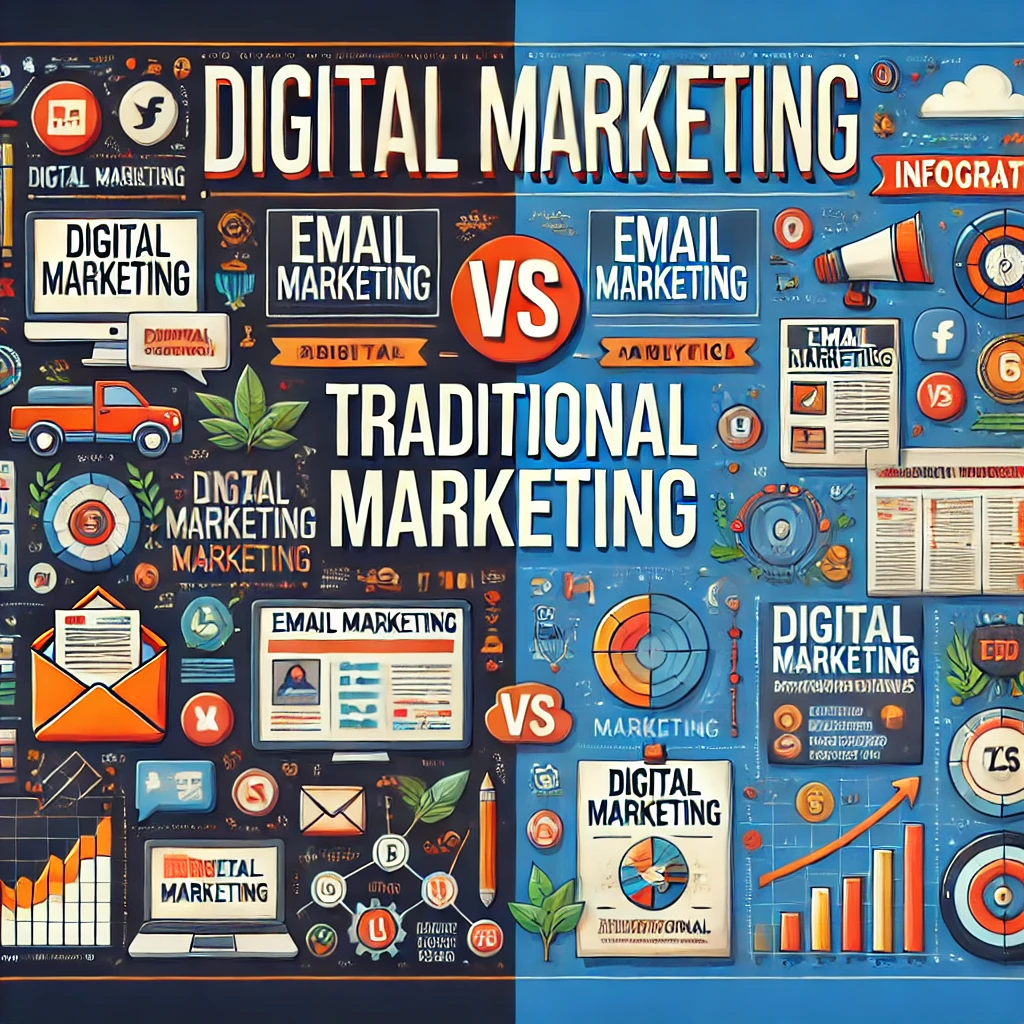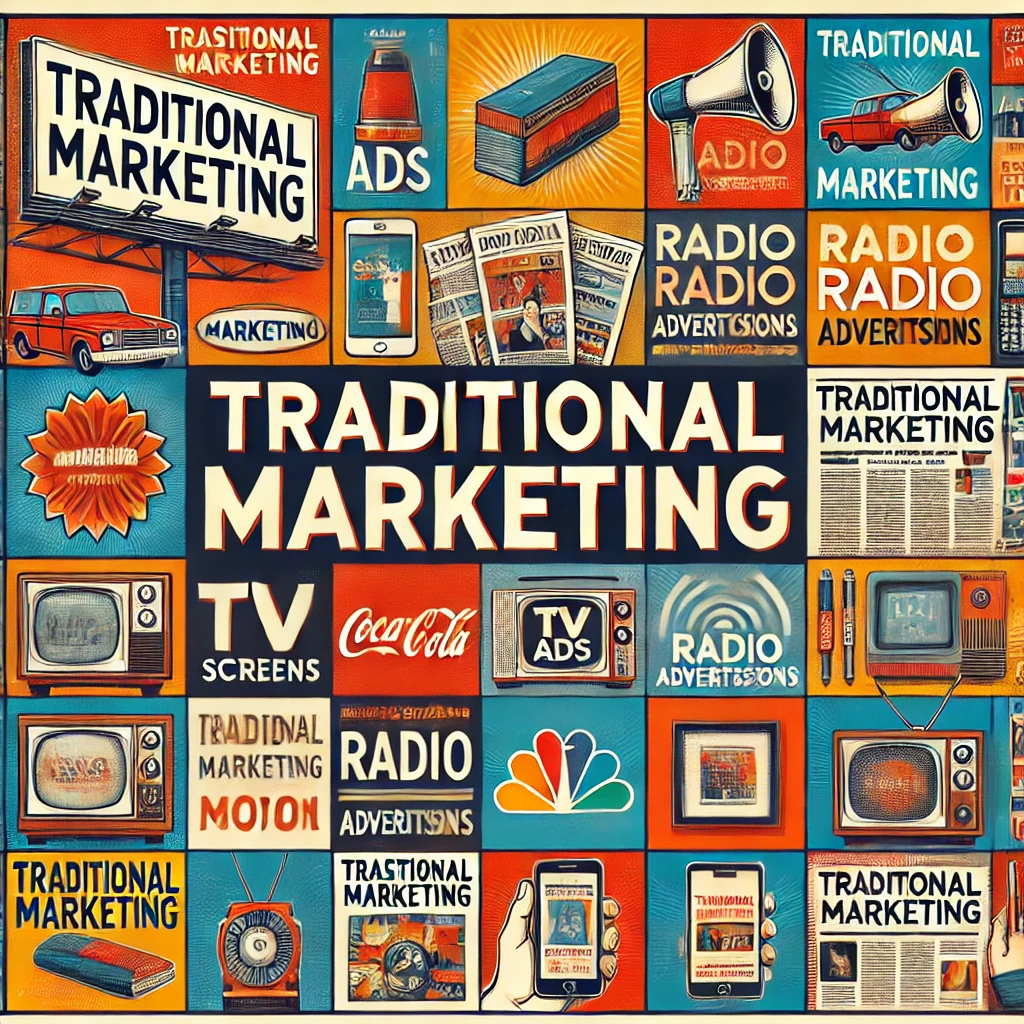Digital marketing vs traditional marketing: An Easy Comparison

When it comes to promoting a business, two common strategies in digital marketing vs traditional marketing. Don’t fret if you’re trying to figure out which option is more suitable for you! We’ll walk you through both types of marketing, explain their differences, and help you decide which might work best for your business.
1. Introduction to Digital and Traditional Marketing
The main goal of marketing is to ensure that your product or service reaches the appropriate audience. But there are two main ways to do this: through digital marketing vs traditional marketing. Digital marketing is done online, while traditional marketing happens offline. Let’s break down what each one is all about.
2. What is Digital Marketing?

Marketing done online is referred to as digital marketing This could include advertising on social media, using search engines, or sending out email newsletters. Basically, if it happens on the internet, it falls under digital marketing.
Some popular examples of digital marketing include:
- 1.Social media ads (like Facebook or Instagram ads)
- 2.Email marketing campaigns
- 3.Google ads
- 4.Blogging and content marketing
- 5.Influencer marketing
Digital marketing is all about reaching people where they spend their time today—on their smartphones, computers, and tablets.
3. What is Traditional Marketing?

Traditional marketing refers to the old-school ways of advertising, like billboards, TV commercials, radio ads, and print media (newspapers and magazines). Before the internet was everywhere, these were the main ways businesses promoted themselves.
Examples of traditional marketing include:
- 1.TV commercials
- 2.Radio ads
- 3.Billboards and posters
- 4.Newspaper and magazine ads
- 5.Flyers and brochures
Traditional marketing reaches people offline, often when they’re commuting, reading the paper, or watching TV.
4. Key Differentiators Between Digital and Traditional Marketing
Here are some major differences in Digital marketing vs traditional marketing:
- Reach: While conventional marketing is primarily regional, digital marketing may reach consumers worldwide.
- Cost: Digital marketing is often cheaper and more flexible. Starting small and then increasing as necessary is a good approach. Conventional marketing methods such as TV or radio advertisements can come with high costs.
- Targeting: Digital marketing lets you target specific groups of people (like age, location, interests), while traditional marketing reaches a broader audience.
- Tracking: With digital marketing, you can track exactly how many people saw your ad and interacted with it. Traditional marketing makes it more difficult to measure precise results.
5. Benefits of Digital Marketing

Here’s why many businesses love digital marketing:
- Global reach: You can reach customers anywhere in the world.
- Lower cost: Digital marketing is often more affordable, especially for small businesses.
- Targeted audience: You can show your ads to exactly the people who are likely to buy from you.
- Real-time results: You can instantly see how well your marketing is performing and make changes if needed.
- Better engagement: Through social media or email, you can interact directly with your customers.
6. Advantages of Traditional Marketing
Even though traditional marketing is older, it still has some strong benefits:
- Physical presence: Seeing a billboard or ad in a magazine can leave a lasting impression.
- Reaches offline audiences: Not everyone is online all the time, so traditional marketing can reach people who aren’t using the internet much.
- Tangible materials: Flyers, brochures, and print ads can be physically handed out, which can create a personal connection.
7. Cost Comparison: Digital vs Traditional Marketing
- Digital marketing is generally more affordable. You can set a small budget for an online ad and increase it as needed. It also offers a range of free tools, like social media marketing or content creation.
- Traditional marketing can be more costly. TV advertisements on television, radio advertisements, and printed advertisements typically demand a significant initial investment. Billboards, for example, can cost thousands of dollars, depending on location.
8. Targeting Audiences: Digital marketing vs traditional marketing
- Digital marketing allows for precise audience targeting. You can reach specific groups based on their age, interests, location, and even behaviors. For example, if you want to target women aged 25-35 in a specific city, you can easily do that with digital tools.
- Traditional marketing, on the other hand, targets a wider audience. For example, a radio ad or a billboard will reach everyone who happens to tune in or pass by, regardless of their specific interests.
9. Effectiveness and Reach: Which One is Better?
- Digital marketing can be more effective in terms of global reach, especially for small businesses. It’s easier to track, tweak, and scale campaigns.
- Traditional marketing is often better for local businesses or companies targeting a broad demographic. Its physical presence can make a strong impact on customers in a particular area.
10. Measuring Success: Digital marketing vs traditional marketing
- Digital marketing makes it easy to measure success. You can use tools like Google Analytics to see how many people visited your site, clicked on your ads, or made a purchase.
- Traditional marketing is harder to track. For example, it’s difficult to know how many people looked at a billboard or heard your radio ad. You might need to rely on surveys or sales data to measure effectiveness.
11. What is Depends on your business needs
The answer depends on your business needs:
- 1.If you have a limited budget, digital marketing is probably the better option since it’s more affordable and flexible.
- 2.If you want to reach a local audience, traditional marketing might be more effective, especially if your customers are more likely to see a billboard or hear a radio ad.
- 3.If you want to track your results, digital marketing gives you real-time data, making it easier to see what works and what doesn’t.
12. Conclusion: Which one is good Digital marketing vs traditional marketing?
In the debate of digital marketing vs traditional marketing, neither one is inherently better than the other. Everything is dependent upon your target market, budget, and goals. For most businesses today, a mix of both is often the best approach. Digital marketing gives you global reach and precise targeting, while traditional marketing can make a big impact locally.
To Learn More Click



